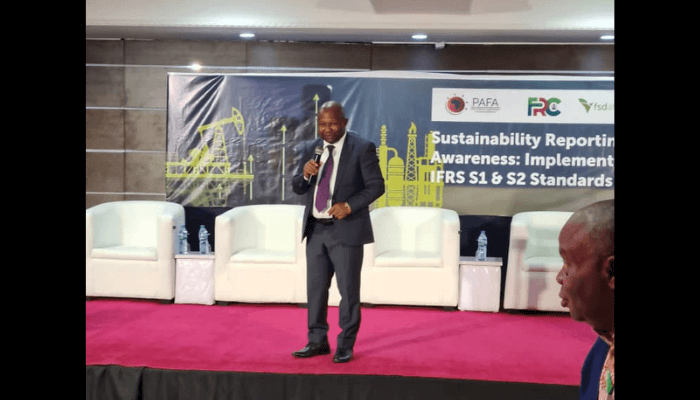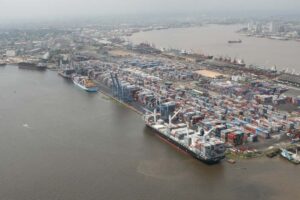
The need to provide a platform for companies and consultants that revitalises sustainability implementation, data collection and reporting in order to empower businesses to move from intention to action, and from action to transparent reporting, received a major boost recently at a stakeholders event in Abuja.
Speaking at the event on ‘The Role of Technology in Sustainability Adoption”, co-organised by Financial Reporting Council (FRC), the President/Lead Consultant of International Network for Corporate Social Responsibility (IN-CSR), Eustace Onuegbu, said: “In the 21st century, sustainability has moved from being a niche concept to becoming a defining feature of how businesses, governments, and societies approach development.
“At its core, sustainability is about striking a balance between economic growth, environmental stewardship, and social equity, ensuring that development meets the needs of the present without compromising the ability of future generations to meet theirs. It is the recognition that long-term prosperity cannot be built on practices that deplete natural resources, exploit people or erode trust. This has built a strong sustainability imperative in today’s climate, where the effects of global warming, biodiversity loss, inequality, and governance failures are starkly evident.”
According to him, “Environmental, Social and Governance (ESG) metrics have become the key mechanism for translating sustainability into practice. ESG provides measurable indicators, such as carbon emissions, labour practices, diversity and inclusion, board accountability, and supply chain ethics, that enable organisations to assess risks, identify opportunities, and communicate performance to stakeholders.
“Investors are increasingly using ESG criteria to determine capital allocation, regulators are embedding ESG disclosure into compliance requirements, and consumers are rewarding companies that demonstrate genuine responsibility. In short, ESG has become the currency of sustainable business.”
Onuegbu however, said that despite its growing importance, sustainability implementation and reporting remain fraught with challenges.
“For many organisations, the process is fragmented, manual, and inefficient. Data often resides in silos, making it difficult to obtain a comprehensive view of sustainability performance. The collection of information across departments can take months, while aligning with the requirements of multiple reporting standards, whether IFRS ISSB, GRI, ISO, EcoVadis, CSRD, or local disclosure frameworks such as the Nigerian Exchange (NGX) or Johannesburg Stock Exchange (JSE) Sustainability Disclosure Guidelines, can overwhelm even well-resourced companies. These difficulties waste time, limit transparency, and risk turning sustainability into a “box-ticking” exercise rather than a driver of real impact.”
He also noted that “The limitations of manual processes or ineffective digital platforms underscore the need for innovation. Just as digital transformation has revolutionised finance, health, education, and commerce, it has immense potential in reshaping the sustainability and ESG landscape.
“Robust digital solutions can automate data collection, standardise metrics, and generate audit-ready reports at the click of a button. More importantly, they can move organisations beyond compliance to insight-driven action by enabling them to identify risks early, improve stakeholder engagement, reduce inefficiencies, and scale positive impact across their value chains.
“It is against this backdrop that the International Network for Corporate Social Responsibility (IN-CSR) has, over the past five years, worked tirelessly with IT developers, sustainability experts, and industry stakeholders to create a groundbreaking platform that addresses these pressing challenges.
“Our vision was to design a solution that is practical for African businesses and robust enough to meet global standards. After extensive research, development, and collaboration, we are proud to introduce Newtral ESG Solutions. The innovative platform enables organisations to launch with confidence, industry expertise and hands-on support to deliver fast and measurable results.”
According to Onuegbu, “Newtral ESG Solutions developed by our exclusive partners, NEWTRAL AI, is an all-in-one digital ecosystem that revitalises how sustainability is implemented, tracked, and communicated. The platform brings together global best practices and local realities in a way that is intuitive, scalable, and transformative.”
Listing the benefits of Newtral ESG Solutions, he said that organisations can effortlessly align with leading frameworks such as IFRS ISSB, GRI, EcoVadis, ISO standards (ISO 26000, ISO 14001, ISO 45001, and others), and CSRD requirements; comply with African regulatory guidelines such as the NGX Sustainability Disclosure Guidance, the JSE Sustainability Disclosure Guidance and other standards across the continent; seamlessly automate carbon accounting across Scope 1, 2, and 3 emissions to enable transparency across the entire supply chain, among others.
“What sets Newtral ESG Solutions apart is its ability to integrate sustainability into the DNA of organisations. It eliminates guesswork and administrative burdens, and frees up the team to focus on strategy, innovation, and impact. It empowers companies to elevate their sustainability performance as a pathway to building trust, competitiveness, and resilience in an increasingly demanding business environment,; he said.
The launch of Newtral ESG Solutions in Africa marks a turning point in Africa’s sustainability journey. It reflects IN-CSR’s unwavering commitment to bridging the gap between global expectations and local realities. Newtral ESG Solutions is about enabling organisations to lead in the global sustainability conversation. It is about equipping them to transform sustainability from a compliance-driven activity into a value-creation strategy that benefits stakeholders and society at large.
“It is important to note that the implementation process, along with data collection and reporting, necessitates a coordinated effort from cross-functional teams led by the Chief Sustainability Officer (CSO) and supported by the accounts department for financial integration, as outlined in implementation frameworks like ISO 26000 Social Responsibility Management Guidance and reporting standards such as IFRS ISSB S1 and S2, and practiced in other jurisdictions,” Onuegbu said.





